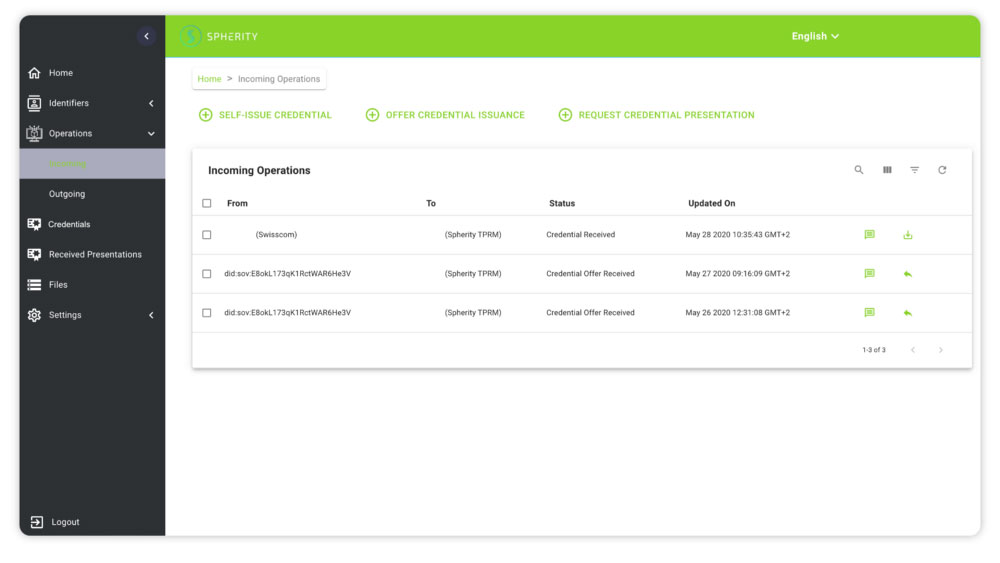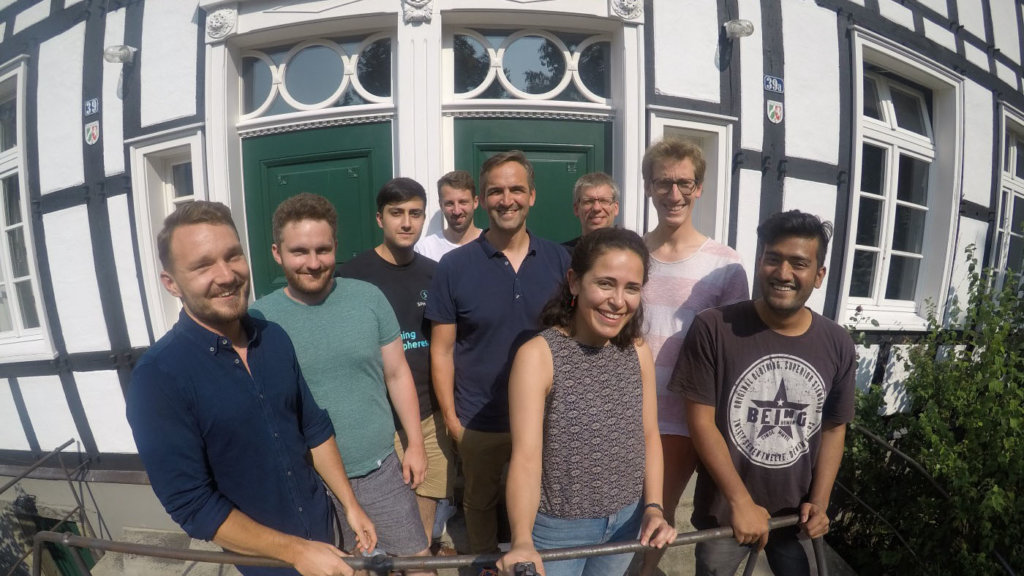Making Digitality Secure - Credentials for Digital Signatures
Ronja Schrimpf
Easily identify any object, substance or software at any time. Easily check its origin and authenticity at any time. Even trace and verify the sustainability of the goods and the manufacturing company at any time, in line with the idea of a circular economy. This is the goal of the Startup Spherity. With its technology, Spherity enables a standardized and secure digital signature that can be used for everything from package inserts for drugs to ingredients in chemical and pharmaceutical substances and supply chain tracking. Spherity thus makes a decisive contribution to secure digitality and also enables more sustainable and environmentally conscious business, as Dr. Carsten Stoecker, CEO and founder of Spherity, explains in an interview with 5-HT.
 Dr. Carsten Stoecker, CEO and founder of Spherity
Dr. Carsten Stoecker, CEO and founder of Spherity4th Industrial Revolution: Fusion of Technology - World Economic Forum
"A tsumani of new technologies is coming towards us. In addition, we already have major problems, from global warming to plastic pollution and human migration," describes Spherity CEO Dr. Carsten Stoecker. In order to get a grip on all these problems and at the same time deal with the new technologies, their risks and above all their opportunities, the World Economic Forum, an international organization for cooperation between public and private bodies, was founded in the 1970s. It had a decisive influence on the founding of Spherity.
The World Economic Forum calls these massive changes 'The Fourth Industrial Revolution' and defines them as a 'fusion of technology' in which three spheres meet: The physical sphere (objects and machines), the biological sphere (living beings and companies) and the digital sphere (digital agents, digital assets and machine learning algorithms). "The spheres all begin to interact with each other. This development is also the origin of our name: Spherity," explains Carsten.
Learn how to see. Realize that everything connects to everything else – Leonardo da Vinci
"Leonardo da Vinci said even then that everything is connected to everything else, long before there was a digital world. Thanks to digitality, this interconnectedness is much more dramatic than it was in da Vinci's time," explains Carsten. "And a core foundation for this great change that is coming is secure digitality.
Autonomous vehicles that can be hacked, access systems that could lock up when people are in between, and even the coffee machine that could suddenly spray hot water - until recently, 'critical infrastructure' meant hospitals, banks and energy networks. With the fourth industrial revolution, everything will become critical infrastructure. That's why the topic of secure digitality is coming directly into everyday life. This is exactly what Spherity is also dealing with."
The global market for digital identities is 1 percent of GDP - bottom-up calculation by Spherity
The market for digital identities is expanding rapidly due to the fourth industrial revolution. The example of digital health, which is opening up a huge market with topics such as patient identity and electronic patient files, the identity of pharmaceutical products and drug package inserts, is proof of this.
"We did a bottom-up calculation of all identity submarkets and came to the conclusion that the global market for digital identities is at one percent of GDP," says Carsten. That's why Spherity hopes to achieve a forward-looking USP with its digital credentials and signatures.
The startup also places particular emphasis on the dynamics of its own technology: whether a product is quality-assured, a company has the license to manufacture certain products, or who the product actually comes from - or through whom it has already passed - all this information must be made available ever more quickly. This is particularly relevant if the individual players use different systems and platforms. This is because Spherity's technology is software and vendor independent.
No longer just encrypted, but also signed data - The transformation of the Internet
"Our credentials represent a transformation of the Internet: we not only encrypt the data, but also sign it. This is enormously important because companies already have tons of data, but they don't know whether this data is authentic and integer. Does the data really come from the source or has a hacker added it? Has the data been manipulated? Or is it not the real source at all?"
So far, companies do not have the tools to answer these questions. The World Wide Web Consortium (W3C) has therefore developed global standards such as Verifiable Credentials, which enable Spherity and other tech companies to shape the transformation of the Internet: From encrypted to encrypted and signed data - and thus to a clear definition of identity.
Spherity focuses on so-called regulated industries with compliance, security and audit requirements, in which signed data must be used to make business processes compliant or more efficient - because up to now these industries have mainly worked with paper signatures. Spherity's largest target groups are the pharmaceutical industry, closely followed by the chemical and life science industries, for whom the signatures and credentials promise more efficient, faster and above all more secure processes. The focus is always on security, compliance and risk.
"Our use cases also include the Supply Chain Act or responsible sourcing - i.e. questions about child labor, environmental protection, labor and human rights, health and safety standards for the respective suppliers," explains Carsten. "But if the supplier can show credentials because someone else has already checked these questions, I as a company can easily verify the credentials and no longer have to check each of these questions myself."
Access all information at any time simply by scanning – Die Circular Cloud
"Our software can even think further into the circular economy," explains Carsten. Questions about traceability, verifiability, identity of products and companies as well as the content of products are becoming increasingly important. According to Carsten, the overarching question, however, revolves around object identity. "In the pharmaceutical industry this is known as electronic product information, in the chemical industry it is known as product information. And companies are increasingly trying to use this information.
By the way, we call this Circular Cloud. If I put all the information and logs in the cloud, anyone can scan in a product and get all the relevant information from the cloud and get all the important credentials. It's very easy to use - and that's the way it has to be."
Groundspace instead of greenfield: integrating technologies into existing infrastructure - Retrofitting
In concrete terms, this means that Spherity develops the software to manage the key for signing data. The software thus enables the signing of data, the management of one's own identifiers and the issuing of so-called verifying credentials, which can then be shared, exchanged with other systems and integrated into corporate processes and programming interfaces (APIs). Thus, the startup takes the idea of established concepts such as Pretty Good Privacy (PGP) and W3C Verifiable Credentials and extends it to all other types of data.
 Spherity Application Screen
Spherity Application ScreenThe startup already has several major customers, including one of the world's most successful manufacturers of security features for banknotes and SAP. Spherity had also found its use case and a suitable market through SAP. "It was very valuable for us to have identified this together with SAP. We specifically target B2B use cases where we have clear business requirements and can best link our software with existing technologies. We call this retrofitting: in the block chain space, there is far too much 'greenfield' thinking, according to the motto peer-to-peer and something completely new. But to bring a technology like block chain into the ground space, i.e. to integrate it into existing technologies, that is missing - and that is exactly what we are focusing on."
Carsten himself, Spherity CEO/CTO, is a physicist and has many years of experience in IT and infrastructure. In 2014, he discovered the block chain and wrote over 40 patents for various industries - from 3D printing and submarines to drones and energy systems. It was also at this time that he began working with the World Economic Forum, where he focused on the fourth industrial revolution. In 2017, Spherity was founded. Co-founder was Dr. Michael Rüther, COO/CFO of Spherity, who comes from the field of business computing and industrial engineering.
 Spherity Team
Spherity Team"The topic of identity is very interesting, but we also knew at the time that it was going to be a very difficult task. There are so many identity companies and providers. Anyone who wants to tackle this task needs a great deal of humility, because the challenge and impact of this task are very great. But we tackled it anyway, because it is a really exciting and interesting job".
5-HT Chemistry & Health Newsletter
Want the latest tech and industry news, events, relevant info from the ecosystem and more?
Subscribe to 5-HT Newsletter now Subscribe to 5-HT Newsletter now
Become part of the 5-HT Chemistry & Health
Exchange ideas with innovative startups and future-oriented companies in our ecosystem. We look forward to meeting you!